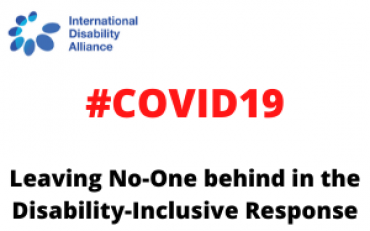This is one story as part of the Voices of People with Disabilities during COVID19 Outbreak series
Names may have been changed to protect the individuals mentioned in the story.
Nearly 800 people across the UK have warned of dangerous cracks in the response to the Covid19 pandemic, which have left them feeling ignored and caused their health and wellbeing to deteriorate.
The Chronic Illness Inclusion Project has previously conducted extensive research among the online chronic illness community, which identified many people are hidden group of disabled people who lack an identity and a voice.
In light of Covid19, the project surveyed people who are not considered to be at the highest clinical risk if exposed to Covid19 but are vulnerable due to multiple impairments.
Here is what they said.
Access to food
“I feel very isolated, frightened, anxious, lonely, hungry, very tired, hopeless. I am hungry due to the fact I need home delivery groceries and it's a three-week wait. I am nearly down to my last scrap of food from my freezer and I don't know what I am going to do.”
“I seem to be in a category where I'm not vulnerable enough to get help with essentials like food shopping, but too vulnerable to catch covid and survive.”
“I do feel that I have been rendered more 'invisible' than usual by the situation. I feel vulnerable due to my health conditions, but it is hard to get food and essentials delivered, as I am not in the 'most at risk' category. I am protecting myself, but I don't feel protected.”
86% of respondents reported that the pandemic has had a negative impact on their ability to access food and essential supplies. This and wellbeing were the areas of respondents’ lives that had been most negatively impacted by the pandemic.
Many of the respondents are largely housebound and rely on supermarket deliveries, which are almost impossible to access, due to overwhelming demand and lack of priority access. Many people with disabilities who have chronic conditions are not listed as people with conditions which pose the highest clinical risk. This means they are not given priority access to food deliveries and basic supplies. It puts them at increased risk of deteriorating health due to hunger and exertion that their bodies cannot tolerate.
Access to healthcare
“Our conditions are not going away and I think the lack of care during this time will cause irreversible damage to many of us and make our conditions even worse. I think policy makers have to understand that many people with chronic and rare diseases already feel like we are forgotten, but there are millions of us and this could cause a tsunami of healthcare problems after the pandemic earthquake.” A respondent living in the East Midlands region.
The pandemic has already had a significant impact on access to GP and specialist care for most of our respondents. Of the respondents under the regular care of a GP or specialist, 66% reported disruption to care during the pandemic. 56% of respondents reported that their health had got worse since the pandemic began, with a significant number reporting the detrimental impact of increased stress and anxiety. This has serious long-term implications for people’s health and will place increased pressure on the NHS and social care once the current crisis has passed.
Discrimination
“I feel a bit like the experiences of disabled and chronically ill people have been at once co-opted and erased. We are experts in isolation yet we've been ignored/told we are expendable.” A respondent from Scotland.
People reported feeling unseen, unheard and unvalued. In addition to the increased difficulties of daily living, many of our respondents reported experiences of discrimination and ableism in shops, the NHS, the media and public conversation.
The world will have more disabled people living with the long-term consequences of COVID-19 infection as a result of this pandemic. Many have been living with the consequences of similar infections for a very long time – their voices need to be heard as part of the effort towards an equitable and truly inclusive approach to disability in times of pandemic and beyond.
To read the full report visit: https://www.centreforwelfarereform.org/library/i-feel-forgotten.html

